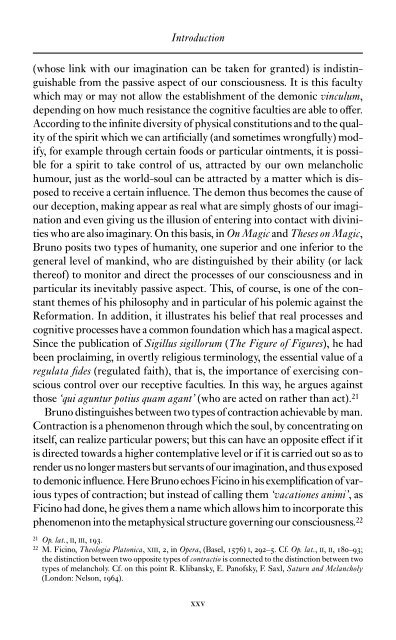Create successful ePaper yourself
Turn your PDF publications into a flip-book with our unique Google optimized e-Paper software.
Introduction<br />
(whose link with our imagination can be taken for granted) is indistinguishable<br />
from the passive aspect of our consciousness. It is this faculty<br />
which may or may not allow the establishment of the demonic vinculum,<br />
depending on how much resistance the cognitive faculties are able to offer.<br />
According to the infinite diversity of physical constitutions and to the quality<br />
of the spirit which we can artificially (and sometimes wrongfully) modify,<br />
for example through certain foods or particular ointments, it is possible<br />
for a spirit to take control of us, attracted by our own melancholic<br />
humour, just as the world-soul can be attracted by a matter which is disposed<br />
to receive a certain influence. The demon thus becomes the cause of<br />
our deception, making appear as real what are simply ghosts of our imagination<br />
and even giving us the illusion of entering into contact with divinities<br />
who are also imaginary. On this basis, in On Magic and Theses on Magic,<br />
Bruno posits two types of humanity, one superior and one inferior to the<br />
general level of mankind, who are distinguished by their ability (or lack<br />
thereof) to monitor and direct the processes of our consciousness and in<br />
particular its inevitably passive aspect. This, of course, is one of the constant<br />
themes of his philosophy and in particular of his polemic against the<br />
Reformation. In addition, it illustrates his belief that real processes and<br />
cognitive processes have a common foundation which has a magical aspect.<br />
Since the publication of Sigillus sigillorum (The Figure of Figures), he had<br />
been proclaiming, in overtly religious terminology, the essential value of a<br />
regulata fides (regulated faith), that is, the importance of exercising conscious<br />
control over our receptive faculties. In this way, he argues against<br />
those ‘qui aguntur potius quam agant’ (who are acted on rather than act). 21<br />
Bruno distinguishes between two types of contraction achievable by man.<br />
Contraction is a phenomenon through which the soul, by concentrating on<br />
itself, can realize particular powers; but this can have an opposite effect if it<br />
is directed towards a higher contemplative level or if it is carried out so as to<br />
render us no longer masters but servants of our imagination, and thus exposed<br />
to demonic influence. Here Bruno echoes Ficino in his exemplification of various<br />
types of contraction; but instead of calling them ‘vacationes animi’, as<br />
Ficino had done, he gives them a name which allows him to incorporate this<br />
phenomenon into the metaphysical structure governing our consciousness. 22<br />
21 Op. lat., II, III, 193.<br />
22 M. Ficino, Theologia Platonica, XIII, 2, in Opera, (Basel, 1576) I, 292–5. Cf. Op. lat., II, II, 180–93;<br />
the distinction between two opposite types of contractio is connected to the distinction between two<br />
types of melancholy. Cf. on this point R. Klibansky, E. Panofsky, F. Saxl, Saturn and Melancholy<br />
(London: Nelson, 1964).<br />
xxv

















